广州版小学英语四年级下册《 ActivitiesUnit 7 What do you do when you have free time》PPT课件 (1)
四年级下册英语教案Unit7Whatarethey课堂教学

本文将从教案的概述、课堂教学环节、教学重点、教学方法和评估方式等方面来详细介绍四年级下册英语教案Unit7Whatarethey课堂教学。
一、教案概述教学目标:1. 能听、说、认读 clothing、luggage、look、heavy、light 等词汇。
2. 能询问和回答 What do you have? What do you wear? What does he/she wear? Is it heavy or light? 等句型。
3. 能以正确的发音和语调进行交流。
教学重点:1. 学生能够听、说、认读本课所学单词。
2. 学生能使用所学语句进行交流。
教学难点:能正确使用be动词形容词结构来形容物品。
二、课堂教学环节1. Warming-up教师通过呈现一些图片,包括各种不同材料制成的物品,让学生回忆起上节课学过的内容。
同时,引导学生关注物品的材料和重量,为本节课的学习做好铺垫。
2. Presentation为学生呈现新词汇和句型,例如套装(suit)和heavy.同时,为了让学生更容易理解新词汇的内涵,教师可以通过图片等教具呈现相关内容。
3. Practice教师可以通过问答练习、口头演练等方式进行课堂练习。
例如,教师可以让学生分组,进行小组对话,让学生练习询问和回答关于物品的重量和材料等问题。
4. Production学生可以利用所学的语言和句型,在课堂上模仿其他学生或教师的对话,并进行创造性的表达和交流。
5. Review and Evaluation评估学生掌握所学内容的程度。
可以通过小组活动或小测验等方式,测试学生对于本节课所学词汇和句型等的认知和应用。
三、教学重点1. 掌握本课所学的单词,包括clothing、luggage、look、heavy、light 等;2. 掌握本课所学句型,包括What do you have? What do you wear? What does he/she wear? Is it heavy or light? 等;3. 能准确使用形容词来描述物品的特征。
四年级下册英语教案Unit7Whatarethey的教学目标

教学目标是教师进行教学设计的基础,一个好的教学目标能够提高教学效果,让学生在学习中更加明确、清晰地了解知识内容并取得更好的成果。
在四年级下册英语教材中,第七单元“Whatarethey”主要引导学生学习动物的英文名称,并通过图片展示的方式帮助学生了解动物的外形和特征。
本文将从教学目标、教学策略、教学评价等方面详细探讨如何帮助学生更好地掌握本单元内容。
一、教学目标1.学会基本的动物名称并能正确发音和拼写2.能够通过图片辨认和描述动物的外形及特征3.能够理解动物的生活习性和生态环境4.了解一些与动物有关的英文诗歌和故事5.培养学生的语言表达能力和思维能力,促进他们对自然界的关注和热爱。
二、教学策略1.多媒体互动教学在教学中运用多媒体设备,通过图片、动画等形式展示动物的形态特征和生活习性,使学生更加生动直观地了解和认识动物。
同时通过教师的语音和图片上的文字帮助学生掌握动物的学名和英文名称,并逐步理解课文内容。
2.游戏和故事教学利用游戏的形式进行课堂教学,增强学生的趣味性和参与度。
同时搭配《狗熊与鼠》、《Cat in the Hat》等与教材相关的英文故事,让学生在轻松愉悦的氛围中更好地掌握语言和知识技能。
3.小组合作学习在课文讲解和示范环节中设置小组合作活动,让学生自由讨论和展示,促进学生彼此交流、合作、分享,从而促进语言表达和思维能力的发展。
三、教学评价1.考试评估设计测验及测试来检测学生的学习效果。
在测试中将涵盖课文、口语、写作等各个方面,并评估学生在知识识记、语言表达和思维能力上的表现。
2.成果展示通过组织展示活动来检测学生掌握的知识和技能水平。
学生可以通过造模,课堂理论演讲,英文朗读等形式自由展示,从中检验其的学习成果,同时也帮助学生更好地了解英语课堂教学的目标和效果。
3.教师评价教师通过观察、记录学生的表现,及时给予肯定和建议,帮助学生更好地适应英语课堂的学习模式和目标。
教师还可以定期与学生和家长进行双向交流,让家长及时获知学生的学习进展,也可以帮助学生更好地制定学习计划和目标,及时纠正他们在学习过程中的不足和问题,提高学习效率和成果。
四年级下册英语教案-Unit7 What’s the matter Story time译林版(三起

四年级下册英语教案-Unit7 What’s the matter Story time译林版(三起)一、教学目标1.能听懂、会读、会说本课的单词和短语;2.能够听懂并理解与本课有关的简单对话;3.能够通过模仿,正确表达自己的身体不适和询问他人的身体状况;4.通过教授本节课的故事,激发学生学习英语的兴趣,加深学生对课文的理解和记忆;5.培养学生积极、主动的学习态度和团队精神。
二、教学重点1.能够听懂并正确理解本课的对话;2.能够正确表达自己的身体不适并询问他人的身体状况。
三、教学难点1.能够通过故事的形式,加深学生的理解和记忆;2.能够准确使用英语词汇表达身体不适和询问他人的身体状况。
四、教学过程(一)热身1.让学生用英语介绍自己的身体部位;2.通过游戏方式,让学生尝试说出身体状况。
(二)新课呈现1.听录音,学习本课的单词和短语;2.通过听故事的方式,学习和理解本课的故事。
(三)教师示范1.教师模仿生病的动作和表情,让学生猜测教师的身体状况;2.教师通过模仿自己生病的表现,让学生练习表达。
(四)小组活动1.学生组成小组,互相模仿生病的表现,并进行交流和表达;2.在小组内,同学们互相询问身体状况,并互相给出建议和帮助。
(五)本课故事1.教师讲解本课故事,让学生仔细听,理解故事情节;2.学生跟读故事,加深理解和记忆。
(六)语言拓展1.教师引导学生学习并掌握表达身体不适和询问身体状况的句子;2.学生模仿教师,进行表达和练习。
五、教学总结通过本节课的学习,学生掌握了与身体状况相关的英语词汇和句子。
通过教授本课的故事,激发学生学习英语的兴趣,加深学生对课文的理解和记忆。
同时,在小组活动中,学生加强了团队意识和合作精神。
译林四下英语Unit7知识点
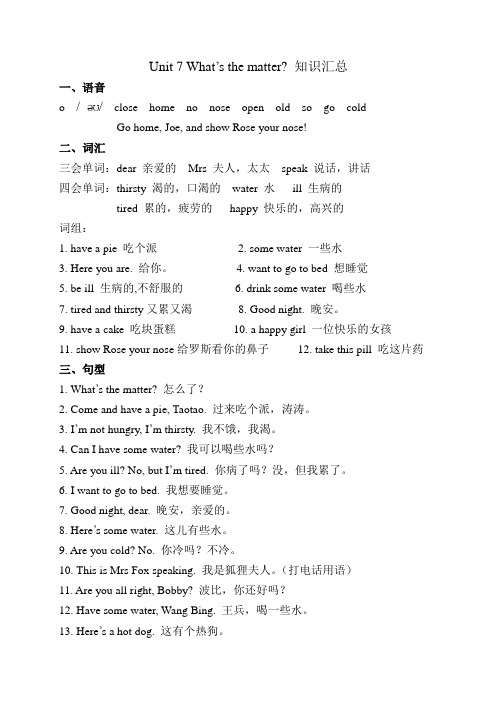
Unit 7 What’s the matter? 知识汇总一、语音o / əʊ/close home no nose open old so go coldGo home, Joe, and show Rose your nose!二、词汇三会单词:dear 亲爱的Mrs 夫人,太太speak 说话,讲话四会单词:thirsty 渴的,口渴的water 水ill 生病的tired 累的,疲劳的happy 快乐的,高兴的词组:1. have a pie 吃个派2. some water 一些水3. Here you are. 给你。
4. want to go to bed 想睡觉5. be ill 生病的,不舒服的6. drink some water 喝些水7. tired and thirsty又累又渴8. Good night. 晚安。
9. have a cake 吃块蛋糕10. a happy girl 一位快乐的女孩11. show Rose your nose给罗斯看你的鼻子12. take this pill 吃这片药三、句型1. What’s the matter? 怎么了?2. Come and have a pie, Taotao. 过来吃个派,涛涛。
3. I’m not hungry, I’m thirsty. 我不饿,我渴。
4. Can I have some water? 我可以喝些水吗?5. Are you ill? No, but I’m tired. 你病了吗?没,但我累了。
6. I want to go to bed. 我想要睡觉。
7. Good night, dear. 晚安,亲爱的。
8. Here’s some water. 这儿有些水。
9. Are you cold? No. 你冷吗?不冷。
10. This is Mrs Fox speaking. 我是狐狸夫人。
人教版小学英语四年级知识点整理完整版

人教版小学英语四年级学问点整理HEN system office room 【HEN16H-HENS2AHENS8Q8-HENH1688】小学四年级英语知识点整理上册Unit 1 School Subjects (After school)一.重点词汇:( Vocabulary)英语语文音乐美术. 数学二.Sounds and words:米饭老鼠脸跳舞科学cream 冰淇淋三.重点句子:〔Target〕1.Do you like math? Yes, I do. 你宠爱数学吗?是的,我宠爱。
2.Do you like science? No, I don’t. 你宠爱科学吗?不,我不宠爱。
3.What subjects do you like, Gogo? 果果,你宠爱什么科目?I like art and music. 我宠爱美术和音乐。
4、What’s that? 那是什么?It’s my science book. 那是我的科学书。
5.I like science, math, English, and .我宠爱科学,数学、英语和体育。
6.What do you like, Gogo? 果果,你宠爱什么什么科目?I like art, too.我也宠爱美术。
四、重点句型1.问某人宠爱哪个科目,可以用句型:What subjects do/does like?如:1)What subjects do you like? I like math and music.2)What subjects does he/she like? He/She likes math and music.2.问某人是否宠爱某个科目,可以问:Do/Does like? 如: 1〕Do you like math? Yes, I do./ No, I don’t.2〕Does he like math? Yes, he does./No, he doesn’t.3.一起做某事,应当说:Let’ s.( let’s后面加动词原形〕Unit2 School Activities (Gogo is skating )一. 重点词汇:(Vocabulary)painting 绘画read 阅读 3. sleep/sleeping 睡觉singing 唱歌writing 写字 6. study/studying 学习7. play/playing 玩running 跑步二.Sounds and words:1. painting 绘画2. reading 阅读3. sleeping 睡觉4. singing 唱歌5. fishing 钓鱼6. swimming 游泳三.重点句子: 〔Target〕1 .What are you doing? 你正在干什么?I’m writing.我正在写字。
广州小学英语四年级上下册知识点及练习
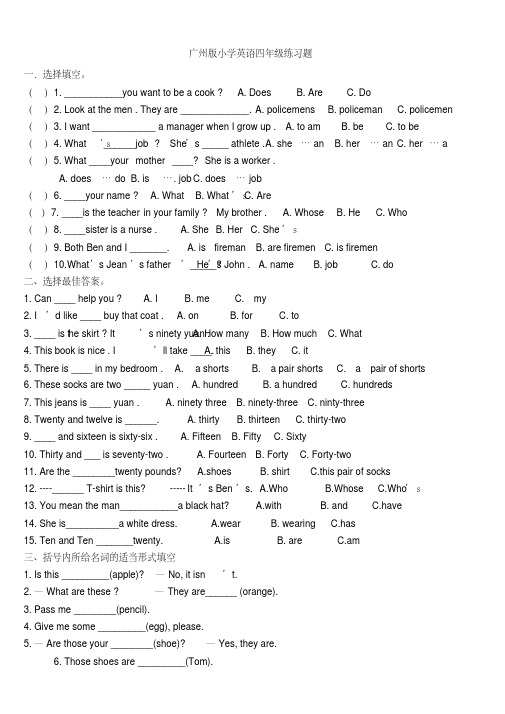
广州版小学英语四年级练习题一.选择填空。
()1. ___________you want to be a cook ? A. Does B. Are C. Do()2. Look at the men . They are _____________. A. policemens B. policeman C. policemen ()3. I want ____________ a manager when I grow up . A. to am B. be C. to be()4. What ‘s______job ? She’s _____ athlete . A. she … an B. her … an C. her … a ()5. What ____your mother ____? She is a worker .A. does … doB. is …. jobC. does … job()6. ____your name ? A. What B. What’sC. Are()7. ____is the teacher in your family ? My brother . A. Whose B. He C. Who()8. ____sister is a nurse . A. She B. Her C. She’s()9. Both Ben and I _______. A. is fireman B. are firemen C. is firemenHe’s John . A. name B. job C. do()10.What’s Jean’s father’_____?二、选择最佳答案。
1. Can ____ help you ? A. I B. me C. my2. I’d like ____ buy that coat . A. on B. for C. toA. How manyB. How muchC. What3. ____ is t he skirt ? It’s ninety yuan .A. thisB. theyC. it4. This book is nice . I’ll take ____.5. There is ____ in my bedroom . A. a shorts B. a pair shorts C. a pair of shorts6. These socks are two _____ yuan . A. hundred B. a hundred C. hundreds7. This jeans is ____ yuan . A. ninety three B. ninety-three C. ninty-three8. Twenty and twelve is ______. A. thirty B. thirteen C. thirty-two9. ____ and sixteen is sixty-six . A. Fifteen B. Fifty C. Sixty10. Thirty and ___ is seventy-two . A. Fourteen B. Forty C. Forty-two11. Are the ________twenty pounds? A.shoes B. shirt C.this pair of socks12. ----______ T-shirt is this? -----It’s Ben’s. A.Who B.Whose C.Who’s13. You mean the man___________a black hat? A.with B. and C.have14. She is__________a white dress. A.wear B. wearing C.has15. Ten and Ten _______twenty. A.is B. are C.am三、括号内所给名词的适当形式填空1. Is this _________(apple)? —No, it isn’t.2. — What are these ? — They are______ (orange).3. Pass me ________(pencil).4. Give me some _________(egg), please.5. — Are those your ________(shoe)? — Yes, they are.6. Those shoes are _________(Tom).7.This _________(T-shirt) is big.四.选择适当的单词填空。
四年级下册英语教学设计-Module 4 Activities Unit 7 What do you

四年级下册英语教学设计-Module 4 Activities Unit 7 What do you usually do when you have free time 教科版(广州,三起)教材分析此教材是四年级下册英语中的第四个模块,第七个单元,主题为What do you usually do when you have free time?主要内容包括表示自己在闲暇时间喜欢做什么的问句和回答,如watch TV、play computer games、read books、draw pictures等。
教材中提供了一些与主题相关的短语和单词,如free time、usually、watch TV、play computer games、read books、draw pictures等。
同时还提供了一些注意事项,如要注意用英语来回答问题等。
本单元的教学内容与学生的生活经历密切相关,可以帮助学生更好地表达自己的兴趣爱好以及扩大自己的词汇量。
教学目标本单元的教学目标是:1.学生能够理解并能够使用本单元涉及到的常用短语和单词。
2.学生能够回答What do you usually do when you have free time的问题,表达自己的兴趣爱好。
3.学生能够通过在课堂上进行对话、模拟情景等方式来锻炼和提高自己的口语表达能力。
教学重点本单元的教学重点是:1.确认学生对本单元中出现的单词和短语的理解。
2.帮助学生初步掌握how to do something的用法。
3.培养学生通过模拟情景等方式来进行口语表达的能力。
教学难点本单元的教学难点是:1.学生如何能够更好地运用how to do something表达自己的偏好。
2.如何帮助学生用英语来进行表示兴趣爱好的对话。
教学过程Step 1. 导入新课在本节课的导入环节,我将使用一些图片或视频来帮助学生理解本单元的中心主题,引导学生思考What do you usually do when you have free time这个问题。
四年级下册英语教案Unit7Whatarethey的教学反思与总结

本人在教授四年级下册英语教学中,积极推动了Unit 7 What are they这一单元的教学。
次教学中,我将注意力放在了教授复数形式、描述动物和宠物的外貌特征、产品标志和文化背景知识等方面,取得了一定的教学效果。
在教学中,我采取了多种教学策略,如PPT 演示、竞赛游戏和课堂互动等,以帮助学生更好地理解课程内容,同时在教学后还进行了总结反思。
将附加合理解释,详细说明这些方法在我们教学中的应用。
针对描述动物和宠物的外貌特征这一课程目标,我多次在课堂上进行了PPT演示。
我从实际生活中挑选了一些狗狗和猫咪的图片,并向学生展示了这些动物的颜色、尺寸和其他一些常见特征。
通过这种方法,我可以引导学生对不同的动物有一个更直观的认识,并让他们使用这些特征识别、描述和区分不同的动物。
课堂上,学生可以互相展示自己所描述的动物,以此来促进他们的学习和掌握。
是针对产品标志这一课程目标,我采取了竞赛游戏的方式。
我提前选取了一些世界著名品牌的图案,将它们贴在教室的围墙上。
我告诉学生:“今天,你们可以尽情地参与我们的小游戏!我们将挑战所有全球知名品牌的产品标志。
如果你们感觉充满信心,就尝试发现每个标志,并尽可能多地回答问题!”游戏中,每个学生都有机会亲身体验和记忆这些东西,并且感到乐趣和激动,这有助于提高他们学习英语的积极性。
对于文化背景知识这一课程目标,我在课堂上进行了互动。
我穿着凉鞋、拿着一把伞,说英语让学生猜测我所在国家的名称。
同时,我向学生介绍了一些该国的著名景点、节庆活动、传统服饰以及其他文化元素,并要求学生还原这些信息的概述。
这种直观的教学方法不仅会使学生更好地理解课堂内容,并使他们更好地掌握课程知识,还可以帮助他们在所学的文化知识上加深了解和认识。
在教授Unit 7 What are they这一单元课程时,我尝试了几个新方法,包括PPT演示、竞赛游戏和课堂互动等,这些方法可以激发学生的参与度以及使他们的学习过程变得更加有趣。
广州市版小学英语新编教材四年级下册
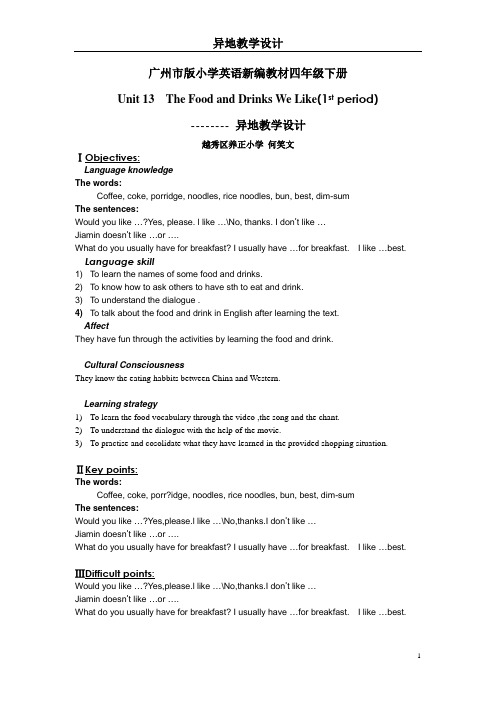
广州市版小学英语新编教材四年级下册Unit 13 The Food and Drinks We Like(1st period)-------- 异地教学设计越秀区养正小学何笑文ⅠObjectives:Language knowledgeThe words:Coffee, coke, porridge, noodles, rice noodles, bun, best, dim-sumThe sentences:Would you like …?Yes, please. l like …\No, thanks. I don’t like …Jiamin doesn’t like …or ….What do you usually have for breakfast? I usually have …for breakfast. I like …best. Language skill1) To learn the names of some food and drinks.2) To know how to ask others to have sth to eat and drink.3) To understand the dialogue .4) To talk about the food and drink in English after learning the text.AffectThey have fun through the activities by learning the food and drink.Cultural ConsciousnessThey know the eating habbits between China and Western.Learning strategy1)To learn the food vocabulary through the video ,the song and the chant.2)To understand the dialogue with the help of the movie.3)To practise and cosolidate what they have learned in the provided shopping situation.ⅡKey points:The words:Coffee, coke, porr?idge, noodles, rice noodles, bun, best, dim-sumThe sentences:Would you like …?Yes,please.l like …\No,thanks.I don’t like …Jiamin doesn’t like …or ….What do you usually have for breakfast? I usually have …for breakfast. I like …best.ⅢDifficult points:Would you like …?Yes,please.l like …\No,thanks.I don’t like …Jiamin doesn’t like …or ….What do you usually have for breakfast? I usually have …for breakfast. I like …best.ⅣPreparation:Some pictures , the video and the teaching software.Unit 13 The Food and Drinks We Like(1st period)-------- 异地教学反思养正小学何笑文4月11日,我到清水濠小学进行了一节新授课的异地教学。
小学英语四年级下册第七模块 教案
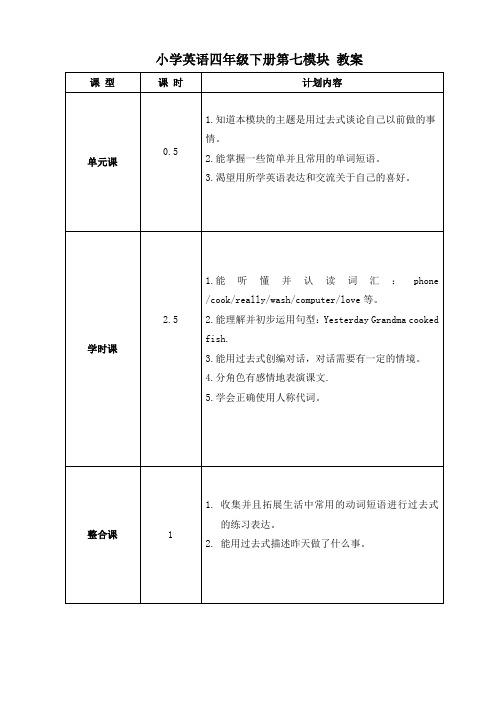
Set up the Pre-class homework before learning..
互学
阶段
Work in four
Share the wordscollectionor cultural reading with group members. If they have some questions or difficulties, they can help each other or ask the teacher.
小学英语四年级下册第七模块 教案
课 型
课 时
计划内容
单元课
0.5
1.知道本模块的主题是用过去式谈论自己以前做的事情。
2.能掌握一些简单并且常用的单词短语。
3.渴望用所学英语表达和交流关于自己的喜好。
学时课
2.5
1.能听懂并认读词汇:phone /cook/really/wash/computer/love等。
文化
阅读
1.课前总结学过的人称代词有哪些。
2.了解中西方人们的日常活动。
学习
重难点
学会并运用有过去式的肯定句。能向他人描述过去发生的事情。
教学
过程
学生活动
教师活动
二次备课
首学
阶段
Finishthe Pre-class homework.
1.Wordscollection.(人称代词)
2.Cultural reading (Richmond Park)
2.会用过去式描述他人过去做了什么事。
学习
目标
1.能听说读写单词,talked, walked, Mrs,Miss,listened,能听懂会说:I talked with......i walked with......Grandma cooked fish.
四年级下册英语教案Unit7Whatarethey的教学准备工作
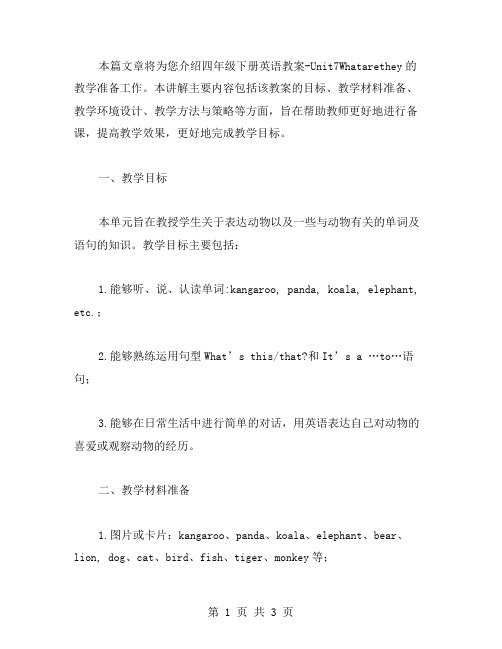
本篇文章将为您介绍四年级下册英语教案-Unit7Whatarethey的教学准备工作。
本讲解主要内容包括该教案的目标、教学材料准备、教学环境设计、教学方法与策略等方面,旨在帮助教师更好地进行备课,提高教学效果,更好地完成教学目标。
一、教学目标本单元旨在教授学生关于表达动物以及一些与动物有关的单词及语句的知识。
教学目标主要包括:1.能够听、说、认读单词:kangaroo, panda, koala, elephant, etc.;2.能够熟练运用句型What’s this/that?和It’s a …to…语句;3.能够在日常生活中进行简单的对话,用英语表达自己对动物的喜爱或观察动物的经历。
二、教学材料准备1.图片或卡片:kangaroo、panda、koala、elephant、bear、lion, dog、cat、bird、fish、tiger、monkey等;2.教学PPT或其他多媒体工具;3.教材配套练习、活动册和师生用书。
三、教学环境设计设计一个舒适、宽敞、安静的教室环境,教室内应该有充足的光线和适度的温度。
教师可以根据具体情况,在教室内放置一些与动物相关的海报或图片,以便更好地激发学生学习的兴趣和热情。
四、教学方法与策略在教学过程中,要灵活运用多种不同的教学方法和策略,让学生更好地走进英语学习的世界。
1.任务型教学法在教学单元初期,教师可利用一些教学游戏或任务,尝试引导学生尽可能多地使用所学英语单词和句型。
例如,教师可以组织学生进行角色扮演,练习其说英语的能力。
有时,在教师的帮助下,学生可以自己设计一些小游戏或任务,以此来增强他们的学习兴趣和积极性。
2.反复操练与模仿式教学法在进行语言学习时,一个人多次练习同一个内容是非常重要的。
教师可以反复演练并专家模仿学生进行单词和句子的发音。
通过专家模仿,学生可以更好地降低口音,并更好地理解发音方式。
3.学生-中心教学技术学生-中心教学法将学生视为学习过程的中心,并通过组织学生互动来完成教学任务。
四年级下册英语第七模块课文

四年级下册英语第七模块课文Lesson 1: My HobbiesHello, everyone! In today's lesson, we will talk about our hobbies. Hobbies are activities that we enjoy doing in our free time. They bring us joy and help us relax.First, let's talk about my hobbies. I have several hobbies that I love. One of my hobbies is reading books. I enjoy reading different types of books, such as adventure, mystery, and science fiction. Reading not only helps me improve my language skills but also takes me to different worlds and broadens my horizons.Another hobby of mine is playing the piano. I started learning to play the piano when I was six years old. The sound of the piano is so beautiful and it always brings me a sense of peace. I practice every day to improve and learn new songs. Playing the piano is not only a hobby but also a way for me to express my feelings.Now, let's talk about your hobbies. Raise your hand if you want to share your hobbies with us. Great, I see many hands raised! Let's hear from Sarah. Sarah, what is your hobby?Lesson 2: A Day at the ParkGood morning, everyone! In today's lesson, we will discuss a day at the park. Parks are wonderful places where people can relax, exercise, and have fun.Last Sunday, my family and I went to the park. It was a beautiful sunny day. When we arrived, we saw many people enjoying various activities. Some were jogging, others wereriding bicycles, and some children were playing on the swings and slides.We decided to have a picnic in the park. We spread out a blanket on the green grass and unpacked our delicious food.We enjoyed sandwiches, fruits, and snacks together. The fresh air and beautiful scenery made our picnic even more enjoyable.After the picnic, we joined a group of people playing frisbee. It was so much fun! We laughed and ran around,trying to catch the frisbee. It was a great way to relax and bond with my family.As the sun started to set, we packed up our things and headed home. We were tired but happy after a wonderful day at the park. I can't wait to visit the park again soon!Lesson 3: Our School TripHello, everyone! In today's lesson, we will talk aboutour school trip. School trips are exciting opportunities forus to learn outside the classroom and explore new places.Last month, my class went on a school trip to the zoo. We were all thrilled and couldn't wait to see the different animals. As soon as we arrived, we were greeted by a guidewho showed us around and shared interesting facts about the animals.We saw elephants, giraffes, lions, and many more fascinating creatures. The guide explained their habitats, diets, and behaviors. It was like a live lesson in biology!We also got to feed some animals, which was an unforgettable experience.After our tour, we had a picnic in a designated area. We enjoyed chatting and eating our lunch while surrounded by nature. It was a great opportunity to bond with ourclassmates and teachers outside the school environment.As the day came to an end, we said goodbye to the zoo and headed back to school. We were tired but filled with new knowledge and memories. The school trip was a fantastic learning experience, and I'm grateful for the chance to explore the zoo with my friends.Lesson 4: Our Favorite HolidayGreetings, everyone! In today's lesson, we will share our favorite holiday. Holidays are special times when we can relax, spend time with loved ones, and celebrate.My favorite holiday is Christmas. It's a time of joy and love. Every year, my family and I decorate our home with colorful lights, a Christmas tree, and ornaments. We exchange gifts and have a big feast together.On Christmas morning, we wake up early and excitedly open our presents. The happiness and gratitude fill the room as we appreciate the thoughtful gifts. Later in the day, we gather with extended family and friends for a festive meal.One of my favorite activities during Christmas is singing carols. We go caroling in the neighborhood, spreading cheer and smiles. It's a wonderful feeling to see the joy onpeople's faces as they listen to the familiar tunes.In the evening, we attend a midnight church service to celebrate the birth of Jesus. The beautiful music and message of love make it a truly special experience.Christmas is a time of togetherness and giving. It reminds us of the importance of family, kindness, and gratitude. I look forward to Christmas every year, and it holds a special place in my heart.Lesson 5: Healthy EatingHello, everyone! In today's lesson, we will discuss healthy eating. Eating nutritious food is essential for our growth, energy, and overall well-being.To maintain a balanced diet, it's important to include a variety of foods from different food groups. Fruits, vegetables, whole grains, lean proteins, and low-fat dairy products should be part of our daily meals. These foods provide us with essential vitamins, minerals, and nutrients.Avoiding excessive sweets, sugary drinks, and processed foods is also crucial for our health. While treats are okayin moderation, filling our plates with fresh, unprocessed foods is a better choice.Additionally, drinking plenty of water is vital for staying hydrated and maintaining optimal body functions. It's recommended to drink at least eight glasses of water a day.Remember, healthy eating is not just about physical health but also about feeling good mentally and emotionally. When we nourish our bodies with nutritious food, we have more energy, better focus, and a stronger immune system.Let's make healthy choices and encourage others to do the same. Together, we can develop good eating habits and lead healthier lives.ConclusionIn this module, we explored various topics such as hobbies, park visits, school trips, favorite holidays, and healthy eating. Each lesson provided valuable information and allowed us to express ourselves.Remember, it's important to embrace our hobbies, appreciate nature, explore new places, celebrate special occasions, and nourish our bodies with nutritious food.Let's continue learning and growing together as we move on to the next module. Thank you for your attention and participation.。
四年级下英语教案-Unit 7 what do you do when you have free

四年级下英语教案-Unit 7 What do you do when you have freetime-教科版(广州专用)一、教学目标•能听、说、读、写并理解单词:read, watch TV, play computer games, play basketball, play the piano, draw 和 swim。
•能用Wh-问句句型询问他人闲暇时间做什么事情。
•能用第一人称回答自己在闲暇时间喜欢做的事情。
二、教学内容•Unit 7 What do you do when you have free time三、教学重点•能听、说、读、写并理解单词:read, watch TV, play computer games, play basketball, play the piano, draw 和 swim。
•能用Wh-问句句型询问他人闲暇时间做什么事情。
四、教学难点•能用第一人称回答自己在闲暇时间喜欢做的事情。
五、教学方法•教师讲授、呈现图片等多种方法相结合。
六、教学过程【引入】(5分钟)1.教师出示图片,让学生进行观察并谈论图片中人物正在做什么事情。
2.引出学习目标:“今天我们将学习一些用于询问和回答‘闲暇时间’的英语句型,以及一些常用的词汇,例如:read, watch TV, play computer games, play basketball, play the piano, draw 和 swim。
通过学习本课内容,我们能初步了解其他同学的爱好和习惯,并一起切磋学习英语的方法。
”【呈现单词】(10分钟)1.教师出示单词表:read, watch TV, play computer games, play basketball, play the piano, draw 和 swim。
并让学生跟读每个单词。
2.教师出示相关图片,让学生边看边说出单词。
【学习语句】(10分钟)1.教师出示语句表:What do you do when you have free time?I read, watch TV, play computer games, play basketball, play the piano, draw, swim。
四年级下册英语教案Unit7Whatarethey课堂互动游戏

四年级下册英语教案-Unit7 Whatarethey课堂互动游戏在学习英语课程的时候,为了提高学生的学习兴趣和参与度,老师们常常会采用一些互动游戏来与学生进行互动,有针对性地进行教学。
在四年级下册英语教学中,Unit 7 What are they是一个重要的课程单元,其内容涉及到了一些简单的家居用品和食品等生活用品的名称。
在进行这个单元的教学过程中,我们可以通过一些互动游戏来使得学生们更好地掌握这些单词的发音和意义,下面就为大家介绍一些常见的四年级下册英语教案-Unit7 Whatarethey课堂互动游戏。
Game1-掷骰子游戏1. 准备一些印有不同单词的卡片和一个大的骰子。
2. 将卡片放在地上,由学生轮流掷骰子。
3. 掷到几点就要拿走相对应的卡片,读出卡片上的单词。
4. 当学生收集到所有卡片时,将会是游戏获胜者。
此游戏可以帮助学生迅速识别出不同的家居用品和食品单词,并且通过竞争,可以有效提高学生的注意力和积极性,是一个非常有效的互动游戏。
Game2-猜测游戏1. 让学生准备一些关于家居用品和食品名称的卡片,卡片的背面写上相应的单词。
2. 让学生围成一个圆圈,轮流抽取卡片,不看卡片上的单词,想象卡片上的单词,描述这个物品的形状、颜色、用途等特征。
3. 其他学生需要根据这些特征来猜测这个物品的名称。
4. 猜对者可以有奖励。
通过这个游戏,可以帮助学生巩固对单词含义的理解,并通过描述和猜测的互动,提高学生的口语表达能力和思维能力。
Game3-快速拼写比赛1. 准备一些家居用品和食品的名称卡片,将这些卡片混合在一起,形成一个卡片堆。
2. 在黑板上先写出所有的单词。
3. 让学生以小队为单位来进行比赛,每次轮到一个人来到黑板前,从卡片堆中抽出一张卡片,尽可能快地拼写出这个单词,并填写到黑板上的相应的位置上。
4. 此游戏不仅可以让学生不断地复习家居用品和食品的名称,而且可以在互动之中快速提高他们的拼写水平。
广州小学英语四册下 词汇范围
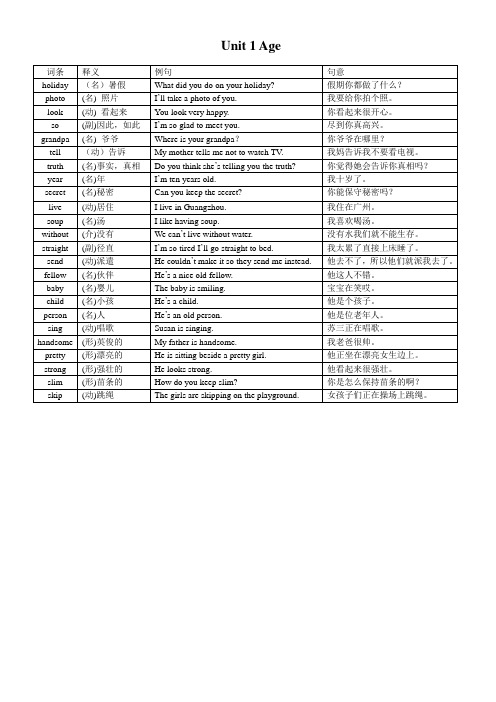
(名)金
Medal gold.
金牌
Olympic Games
奥林匹克运动会
Beijinghosted the Olympic Games in 2008.
北京在2008年举行了奥林匹克运动会。
Well done
做得好!
Well done! Congratulations, Tom!
做得好!汤姆,祝贺你!
苏三是获胜者。
jump
(动)跳
Kangaroos can jump far.
袋鼠们可以跳很远。
race
(名)赛跑
You win the race.
你ห้องสมุดไป่ตู้得了这场赛跑。
slow
(形)慢的
You are too slow.
你太慢了。
never
(副)从不
You never help me.
你从不帮我。
high
Weight-lifting
举重
John is good at weight-lifting.
约翰擅长于举重。
record
(名)记录
She is a setter of a world record.
她是世界纪录的创造者。
Here we come!
我们来啦!
Beijing, here we come!
她唱地不好。
favourite
(形)最喜欢的
Coke is my favourite drink.
可乐是我最爱的饮料。
badminton
(名)羽毛球
He is good at badminton.
她擅长羽毛球。
tennis
【广州市】教科版四年级下册英语教材分析
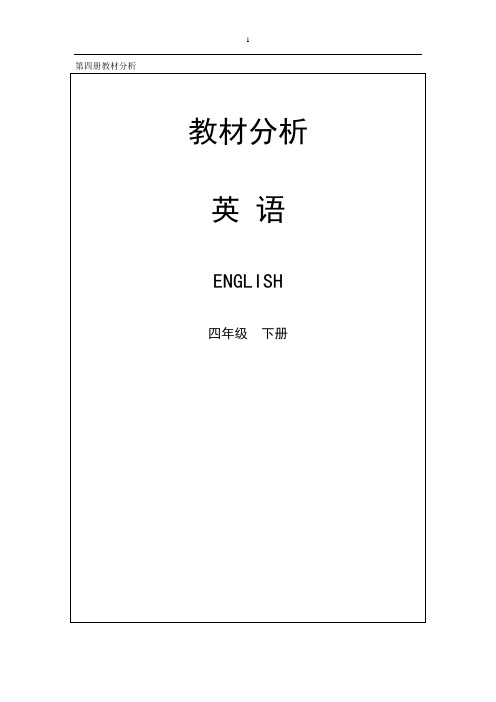
第四册教材分析教材分析英语ENGLISH四年级下册第一部分:编写思路:1、以国家《英语课程标准》(2011版)的精神编写教材《英语课程标准》(2011版)(以下简称《课程标准》)指出:语言是人类最重要的思维和交流工具,也是人们参与社会活动的重要条件。
学习外语与学习母语一样,对促进人的全面发展具有重要意义。
(1)小学英语课程是必修棵程:外语是义务教育阶段的必修课程,英语是外语课程中的主要语种之一。
英语课程的学习,既是学生通过英语学习和英语实践活动、逐步掌握英语知识和技能、提高英语实际运用能力的过程,更是他们拓展视野、丰富生活经历、促进思维发展、锻炼意志、陶冶情操、发展个性和提高综合人文素养的过程。
(2)义务教育阶段英语课程的任务:激发和培养学生学习英语的兴趣,使学生树立自信心,养成良好的学习习惯和形成有效的学习策略,发展自主学习能力并培养合作精神;使学生掌握一定的英语基础知识和听、说、读、写技能,形成一定的综合语言运用能力;培养学生的观察、记忆、思维、想象能力和创新精神;帮助学生了解世界以及中外文化的异同,拓展视野,培养爱国主义精神,形成健康的人生观,为他们的终身学习和发展打下良好的基础。
(3)小学英语课程具有弹性课程课程标准》同时指出:各地教育行政部门应根据本地师资条件、资源配置等实际情况,制定本地课程的实施措施。
实施措施可确定本地小学起始年级、学习进程、评价指标和义务教育阶段毕业时的英语学业级别。
英语师资条件有限的地区,英语课程起始年级可以适当推后。
教育行政部门应积极创造条件,采用多种途径,加强有针对性的教师培训,开发和配置课程资源,尽快达到国家课程标准要求。
各地教学研究部门应加强对教学的分类分层指导和评价,帮助学校因地制宜地落实本地课程实施方案,并注意做好学段之间的协调和衔接,尤其是小学与初中阶段的平稳过渡,促进地区英语教育的均衡发展。
师资与社会经济发展条件较好的地区,英语课程起始年级可以适当提前。
基于主题意义的小学英语单元整体教学设计案例分析

1662021年35期总第579期ENGLISH ON CAMPUS【摘要】本文旨在为广大一线英语教师提供基于主题意义的小学英语单元整体教学参考案例,共同探讨整体教材观在实际教学中的应用。
【关键词】单元整体;主题意义;案例分析【作者简介】龙韵洁,江门市范罗冈小学。
基于主题意义的小学英语单元整体教学设计案例分析文/龙韵洁一、前言单元教学囊括了课程内容六要素,承载着学科素养侧重培养的目标任务,通过英语课程学习促进学生成长,是一个比较完整的课程周期(梅德明、王蔷,2018)。
英语单元整体教学强调教学过程的完整性,是教师教材观的革新。
它要求对单元内容中具有内在关联的要素进行分析、重组、整合,在教学整体观的指导下优化单元整体结构,形成相对完整的教学单元(吕世虎,2016)。
符合基于核心素养指向的义务教育阶段新课标提出的创造性地使用教材的指导理念。
然而在实际课堂教学中,为了追求测试成绩,教师们缺乏对教材的整体解读,过分关注教材中的知识和技能,把单元内容切割成几个单独内在关联不大的单一课时,使得材料碎片化、教学目标碎片化、教学活动流于形式,而学生们也“只见树木,不见森林”。
那么,如何做好整体单元教学设计呢?教师需要有整体单元意识,对教学内容的呈现不应是简单的堆砌。
应是基于教材内容,围绕单元主题,对有关联的单元板块进行重组、调整、文本重构或是增设有必要的内容,使单元内容更完整、更契合学生学情地呈现出来。
本文结合粤人版《英语》四年级下册Unit 8“Weekend Fun”为例,分析该单元整体教学设计的思路。
二、 单元整体教学设计重点1. 正确解读教材并结合学情,确定单元与课时目标。
单元是承载主题意义的基本单位,其目标与总体目标是部分与整体的关系。
教师在设定单元目标时,要有整体教材观,认真分析教材内容,从多方面梳理并概括与单元主题相关的板块内容,充分挖掘开发教材文本的内涵和外延,确定单元整体教学目标(陈剑,2015)。
- 1、下载文档前请自行甄别文档内容的完整性,平台不提供额外的编辑、内容补充、找答案等附加服务。
- 2、"仅部分预览"的文档,不可在线预览部分如存在完整性等问题,可反馈申请退款(可完整预览的文档不适用该条件!)。
- 3、如文档侵犯您的权益,请联系客服反馈,我们会尽快为您处理(人工客服工作时间:9:00-18:30)。
• 3.看电影
• 4.清洁我的房间
• 5.去购物
• 6.做家务
8/6/2018
Let’s learn
拍照
m t a k e
m
p h o t o
照片
听音乐
8/6/2018
画画
8/6/2018
发电子邮件给朋友
8/6/2018
去野餐
p
8/6/2018
i
c t n u i
rc e
野餐
Let’s Talk
watch TV
do my homework
take exercise
go running
8/6/2018
play sports
go swimming
• 1.去公园
• 2.拜访我的朋友Fra bibliotekgo to the park
visit my friends see a film clean my room go shopping do housework
8/6/2018
f t
r e
空闲的
e
8/6/2018
• 回答:人+频率副词 (always/usually/often/sometimes)+动作
Translation:1.我经常看电视 2.我通常去公园
I often watch TV. I usually go to the park.
8/6/2018
义务教育广州版小学英语教材
Module 4 Activities 活动
Unit 7 What do you usually do on when Sunday? you have free time?
Period 1
广 州 市 小 英 中 心 组
Aim
本课时目标:
1. 掌握新词:free,take photos, listen to music, draw, email,
广 州 市 小 英 中 心 组
• What do you do when you have free time?
当….的时候
当你有空闲时间的时候你做什么?
1.When的用法:a.放在句首,表示提问时间,什么时候 Unit 4的标题是When do you have class?你什么时候上课? b.放在句子中间连接两个句子,表示当……的时候
picnic. 2. 3. 学生能听说读以下新词和短语: take photos, listen to music,
draw a picture, email my friends, have a picnic.
能理解句子What do you do when you have free time? 并试做回答 I usually /sometimes/ often/always…..
